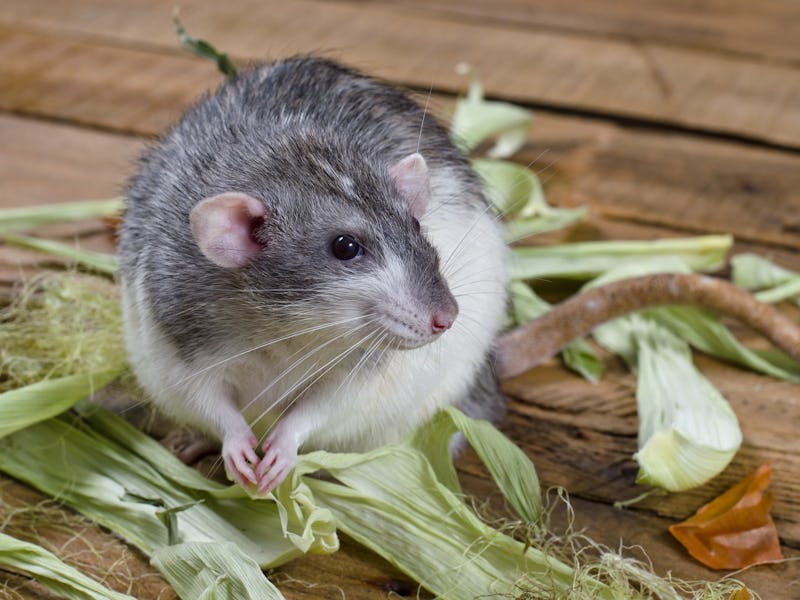Salad Rat reminds us what rodents can teach science about food
We depend on rodent studies for much of the information we have about how food affects the brain and the body.

Taking her place next to infamous NYC subway critters Coffee Rat and, of course, the OG Pizza Rat, there is a new rodent taking New York and Twitter by storm.
Meet Salad Rat.
On Wednesday, Twitter user Sarah Peele tweeted a video of a persistent (and remarkably strong) rat carrying a not-quite-empty salad bowl along the subway tracks.
“Shout out to Salad Rat, stubbornly sticking w her New Years resolutions well into February,” Peele writes.
But on a more serious note, rats like Salad Rat really are the bedrock of all that science knows about food and human health. These four scientific findings simply would not have been possible without their rodent research subject.
1. Eating junk food as a kid has long-term consequences
A poor childhood diet can turn into a life-long problem — and vice versa, according a 2017 study in the journal eNeuro. Eating certain foods, like French fries and milkshakes, early in life may fortify brain pathways that are associated with pleasure-seeking behaviors and could even lead to long-term addiction.
In the study, researchers fed male rats a high-fat diet for about three months, from rat adolescence to adulthood. They then tested how the rats’ brains reacted to injections of amphetamine. The rats raised on a high-fat diet were more sensitized to amphetamine, suggesting their brains were primed to seek out pleasurable experiences — and more likely to become addicted to them.
Separate rat studies suggest the unhealthy “cafeteria” food of the kind served in schools throughout United States can affect the gut microbiome, reducing the biodiversity of microbes and contributing to cognitive impairment.
2. Berries are a “brain food”
Just as unhealthy foods can change your brain, research shows that more healthful foods could affect your cognitive function, too. In studies conducted in rats — as well as in older humans with cognitive impairment — adding berries to your diet may improve how you perform on various memory-related tasks.
Berries are high in antioxidants like vitamin C, anthocyanins, and resveratrol. Studies done in rats' rodent cousins, mice, suggest anthocyanins may diminish inflammation linked to Alzheimer’s disease in the brain. They could also help improve learning and memory. These findings have been replicated to some degree in humans, too: A 2017 study, for example, suggests such antioxidants may improve brain function and blood flow in older adults.
3. Intermittent fasting can make people healthier
Spacing out your food throughout the day — a practice known as intermittent fasting — may help to curb issues with your metabolism. Studies in mice have shown that limiting food intake to just 10 hours during the day can avoid, or even reverse, certain metabolic conditions. And 2019 research conducted in rats with obesity and diabetes showed that intermittent fasting “had a profound impact” on improving their health.
In that study, the researchers tested intermittent fasting in humans to see if the rat-based findings held — and they did. The majority of people in the study lost “a modest amount of body weight,” researchers reported, and people with high blood sugar, high blood pressure, and high LDL cholesterol levels saw their numbers improve.
”All of these benefits happened without any change in physical activity,” the researchers said, suggesting that just changing the timing of your meals can have a significant effect on health.
4. Keto can benefit you — but only in the short-term
The keto diet is often touted as a fast slimming solution, but it might make you less healthy in the long run, according to a 2020 study in the journal Nature Metabolism.
Researchers studied mice on a keto diet to see what long-term effects the extreme diet had on their health. They fed mice a diet of chow that was 89.5 percent fat, 10.4 percent protein, and 0.1 percent carbohydrates.
After a week, the diet did appear to have some benefits for the mice. Their metabolism improved and their levels of inflammation decreased. But after a couple of months on the diet, those benefits reversed. Not only did the benefits disappear, but the mice actually became obese, as Inverse reported at the time.